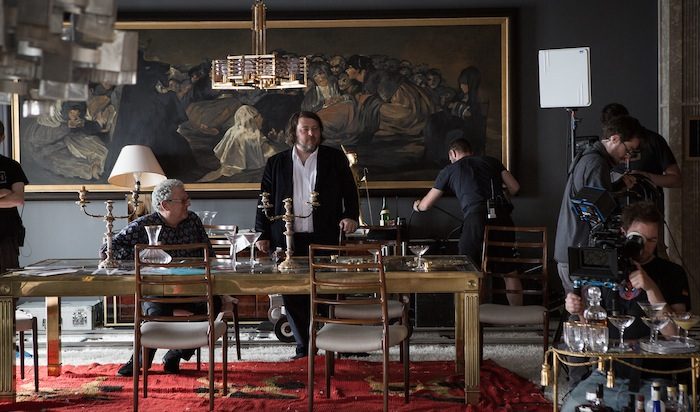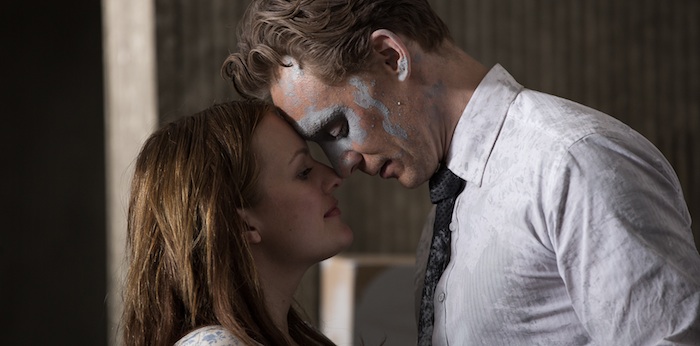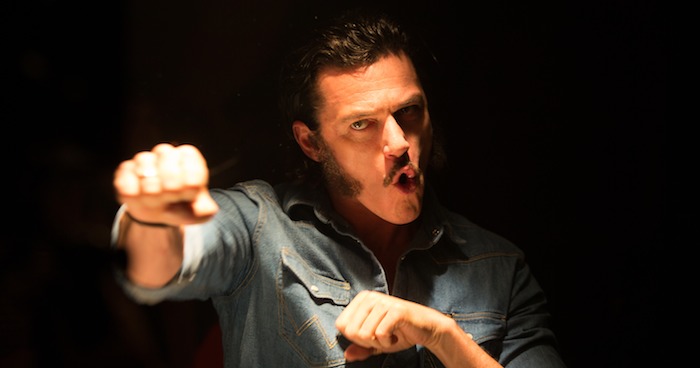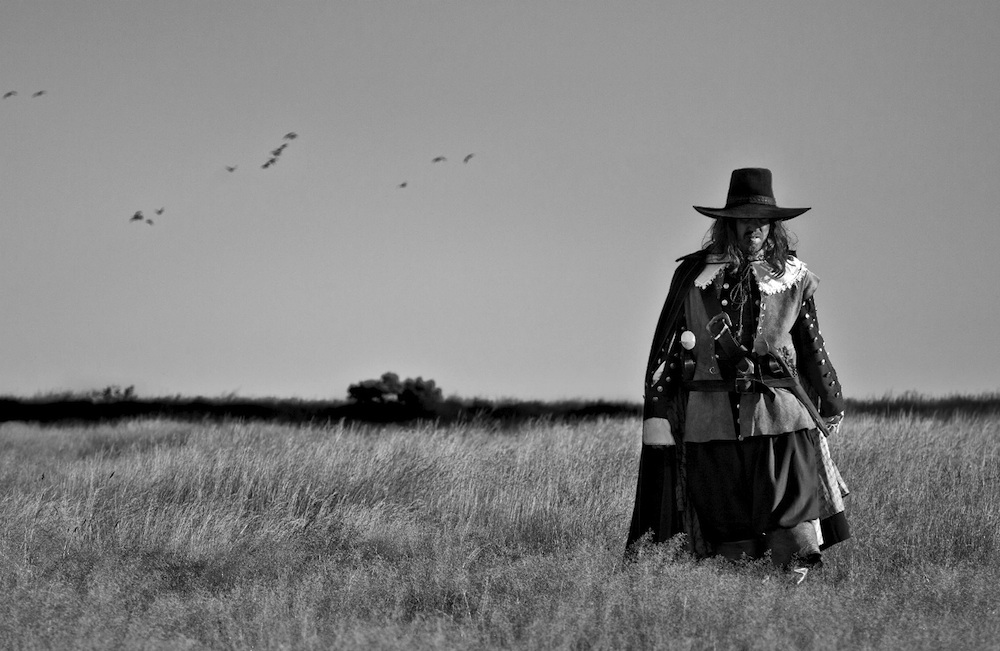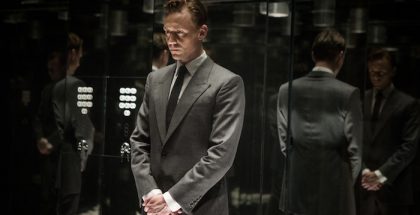Interview: Ben Wheatley, director of High-Rise
Matthew Turner | On 17, Jul 2016
Ben Wheatley’s High-Rise is out now to stream in the UK.
Starring Tom Hiddleston, the bold masterpiece from the director of A Field in England is adapted from JG Ballard’s novel by Amy Jump and features an all-star cast, including Sienna Miller, Luke Evans, Elisabeth Moss, Jeremy Irons and James Purefoy.
Hiddleston plays Dr. Robert Laing (Hiddleston), who moves into his new apartment seeking soulless anonymity in 1975, only to find that the building’s residents have no intention of leaving him alone. Resigned to the complex social dynamics unfolding around him, Laing bites the bullet and becomes neighbourly – and his good manners and sanity swiftly disintegrate. (Read our review of the film here.)
We sit down with Wheatley to talk social commentary, finding the balance between horror and comedy, and hitting someone over the head with a BAFTA.
How did the project come about? I know producer Jeremy Thomas had been wanting to make it for a very long time
Well, I didn’t know he was involved in it to start. After A Field in England, we were just looking at lots of different stuff – we had projects that we were going to do and we’d been pushing them forward and seeing if we could get traction on them. And it seems to me that the way that things work is that you have like lots of projects and then suddenly something becomes really popular within the kind of financier circles and it just suddenly shoots forward… or not, you know.
So I was just at home going through the bookcase and thinking what hasn’t been made and who’s got the rights and it’s usually a thankless task, because anything that’s anything is tied up and I know that the studios have started buying – they don’t buy books anymore, they buy authors, so they’ll buy the whole back catalogue from the family of the author. And I think they’re even getting bigger now where they’ll scoop up whole genres and there’ll be big job lots of books that will be taken.
And so I saw High-Rise and I thought, ‘That’s weird that it’s never been made’ and I called my agent and said who’s got it and he said ‘Oh, Jeremy Thomas has got it.’ And Jeremy Thomas’ son worked in the same agency, like two desks across. So it’s just bizarre, within two or three days I was in the offices at Hanway and RPC and talking to Jeremy. And he’d randomly seen Sightseers like the week before, so if that hadn’t happened, if the timing had been slightly different, none of it would have come together.
You had a copy of the book, so you’d read the book at some point? Had it always been a favourite?
Yeah, I mean it was a book that I’d read as a kid that I’d really liked that fitted in with those kinds of books that you read when you’re 16 or 17 that are kind of that harder edge of esoterica stuff or they’re entry-level books because the radiation from them is so strong that you know about them. I mean, I seem to always have known about that book and Crash, in the same way as I knew what Fear and Loathing was and what Naked Lunch was, way before I’d read a Burroughs book or a Hunter S. Thompson book, so I kind of read it at the time and Crash was a similar experience of like reading it and going [sharp intake of breath], of finding it really alien but exciting and then perverse, but in a way of looking at the modern world and representing it to you that gave you insight into how things are that other fiction didn’t seem to do.
But then coming back to as a 40 year-old, it was more that I re-read it and kind of went, ‘Well, it feels like I’ve been reading Ballard since I was 16 but just not with his name on it’. It seems to me that it’s sunk so deep into society and into culture in a way that probably explains why not that many adaptations have been done because it’s all around us. And it was interesting even on Twitter, when when we announced what we were doing, people going, ‘Oh, it’s Judge Dredd’, you know, but it is Judge Dredd, it is Blockmania, it goes back to those 70s comics and they’re all influenced by Ballard. Or even Snowpiercer – people are going, ‘Oh, it’s Snowpiercer’ – yeah, but Snowpiercer is High-Rise, those are the ideas that have been put, and that’s the thing about Ballard, his ideas are so strong, they just keep cutting through.
The film’s set in a kind of heightened version of the ’70s, but it could just as easily have been Cameron’s voice at the end instead of Thatcher’s. What do you feel High-Rise has to say about today?
Well, there’s a few things there. I believe that, the world, there’s a cyclical historical kind of loop that we’re in, we’re either in the 70s or 80s most of the time and we have been since the war. It’s either we’re all fucked or it’s everyone’s making loads of money and no one wants to think about it and then it’s all fucked again. It just goes backwards and forwards like that. And so what does High-Rise have to say about today, it’s kind of irrelevant, it’s now. And then it’s also like, why do you make a period film or why do you make a sci-fi film? They’re not about the future and they’re not about the past, they’re about now, they always are, all films are about this moment otherwise they don’t have any connection, there’s no traction on them for the audience. And unless you end up in the world of really meta, post-modern filmmaking, where everything’s a reference back to cinema, most films that are talking about this moment should be.
High-Rise was always thought of as one of those books that was kind of unfilmable. What were the main challenges that you faced?
This was a first time Amy Jump, who wrote it, and I have experienced a book adaptation. So there’s a lot of issues with it.
Were you involved in any capacity in writing? Bouncing ideas off each other?
No, no. Which is interesting, because this is part of what the image of the director is. And it’s not necessarily the person – specifically my relationship with Amy, which is our own thing – but there’s a kind of a cliché that the director walks around the room tearing pages out of the book, going ‘This goes here, this goes here, make it work’. And that is kind of true for some things, I mean, I think that Hitchcock’s stuff where they would write a treatment and then get some writer to knock it out, they are the authors of those pieces, but the way that we work is different: she writes it and I don’t have anything to do with that and then I read it and I get some points of clarity on it. And then I’ll shoot it. And then she comes into the edit and we re-organise it in the edit, or not, depending on how well I’ve shot it. So that’s why the credits are different on the end of High-Rise, with the director and writer credits being a shared card rather than a separate hierarchy kind of thing.
In terms of the challenges, the form is so different, a book is so fucking different from a film and it’s, like, a film is literal, absolutely literal, all the time, you see everything all the time, there’s hardly anything you can’t see, it’s really hard to hide stuff away, whereas the book can get away with all sorts of things – the writer is like a man with a torch in a dark room, who’s just showing you things and your brain is kind of putting them together into a picture, but when the book contradicts that picture you’re not that surprised about it, but with film, when you’re literally watching something and then you have a problem with it, then that’s a totally different thing.
Obviously, it’s a time-based medium versus the book, which you can flip backwards and forwards and you don’t feel that the book has failed if you have to flip back a few pages, you just think you haven’t read it properly. And I think that’s different. And also that book, specifically High-Rise, doesn’t have much dialogue in it, so she mainly had to dig the dialogue out of like the reported speech of the book and other sources that she brought to it, so I think that was hard.
But the main difficulty was wrangling that many characters and still trying to be true to the book while reducing some of the characters down and some of the plot lines down so it didn’t run five hours or whatever. It’s those decisions that were the complicated things.
How difficult is it to strike the right balance between horror and comedy in your films and how do you know when it’s working?
I guess when I laugh…
But that’s just you laughing. How does that work for everyone else?
Because I’m the universal person, it’s empathy and humanity, isn’t it? You want to assume that people are like you, because you wouldn’t want to get into making films if you were some totally, socially outcast, not understanding anything about how humanity works and you had to do it. You know, films often take a risk to the more general audience, a bit. But I think a lot of filmmaking is taste and I kind of trust my own taste and trust Amy’s taste, and when we watch stuff and we enjoy it, then we figure that’s job done, you know. There’s lots of people might disagree with that, but that’s their business. If they don’t like it, that’s just whatever. There’s lots of things I don’t like, but I don’t get to complain about it, you know?
I think if you’re making a film that needs to gather an audience of old people and young people and people from China and people from Stockholm and people from all over the world, then it’s a very different kind of filmmaking and not necessarily a bad one, a very challenging one I’d imagine, but it’s not necessarily what we do, at the moment.
I spoke to Elisabeth Moss about High-Rise last year and her main memory was just you giggling at pretty much everything
Yeah, I mean how could you not, in the middle of all that? It was brilliant, having loads and loads of people in costume and really big actors doing really crazy stuff. Just seeing her smoking a cigarette all day long while being pregnant made me laugh a lot.
You assembled an absolutely fantastic cast. What qualities were you looking for in Laing, Charlotte and Royal?
There wasn’t any real question of who we were going to get to get for Laing – we wanted Hiddleston, because there’s lots of different levels to Tom. On one level, he’s kind of like a matinee idol, as far as we’ve got, he’s like a British film star. He’s tall and good-looking and stoic and strong and straightforward. You know. So on that level, as a performer, he has a certain cachet and a meaning. But then, on the other side of it, he’s Tom as a person, he’s very intelligent, but he’s measured, so he controls himself really, really well, which is a trait that is important for Laing, so you can see Tom’s thinking – really quick, but he thinks about what he says and he doesn’t ever put a foot wrong and it’s really brilliant, and when you see him at Q&As and stuff, he’s just amazing.
So that side of it, I knew from watching interviews with him that he would be really good at that and he felt close to Laing, in a way, that he could project his personality into that Laingian space. But then you can see it, almost in the petulance and anger and humour of the Loki performance, that it’s all there and then there’s the realism and subtlety of the Joanna Hogg pieces as well, so that was never a question for us and it was great that he did it, because he made it happen – basically, at the beginning, we wouldn’t have been able to finance the film. So that was great and then you can’t really argue with the Irons casting, because that’s just so perfect. [Laughs]
And then Luke Evans is someone that I kind of knew, I’d seen him in The Hobbit and thought, ‘Who’s that? He’s fucking brilliant, that guy’, but didn’t really think about it, and then his name came up on the casting list and I watched The Great Train Robbery. And then I talked to Neil Maskell, because Maskell was in Train Robbery as well. And he said, ‘Oh god, Luke’s great, really, he’s such a nice guy’. And that’s rare for Neil, so I thought, yeah, okay. [Laughs].
I was going to say, I think this is the best thing Luke Evans has done
Oh, man, so I met him and I could see he could be really cross. And he hadn’t been – he was kind of smouldering in The Hobbit, but you could see there’s much more energy and anger that’s in him. And then we just let him rip, really, and that was a revelation.
And Sienna?
I’ve liked Sienna’s stuff since seeing her in Factory Girl. I’d seen her in that and up until that point, I only knew her from newspapers and then I watched the film and I saw the titles and was like, ‘Fuck, that’s Sienna Miller, oh my God, she’s brilliant, that totally doesn’t tally with my slightly prejudiced view of what she would be like’. And then I saw her in The Girl as well and thought she’s brilliant in that and then I met her and she was terrific. But her and Elisabeth Moss have got this thing of, you know, you look at the rushes and there’s no spare frames in any of that stuff, everything they do is great.
Do you have a dream project you’ve always wanted to make?
I don’t know. I don’t have dream projects, but there’s some stuff we’re working towards. We’re kind of trying to go towards doing a Battle of Britain project, maybe, or some big State of the Nation type thing. I want to do some big sci-fi stuff if I can. I think it’s like, to be able to have a career where – alright, the big dream project is this, is to have a career that’s like a 1940s director, to be able to go from genre to genre and from assignment to assignment that are all very different and for the films to be good. If I can do that, then that will be brilliant, but it’s not a specific thing.
There’s not another book, for example, on the same bookshelf that you’re thinking, ‘Well, maybe that one…’?
Not at the moment. I mean, we’re a bit gun-shy for adaptations of books at the moment, because it is a tricky one. A book gives you a leg up in terms of, just on a basic level of people know about it, will want to know about the adaptation of that book because they like it. So that’s an advantage, but the disadvantage is the flip-side of that coin, is that you then can’t – depending on how roughly you handle the book, you get into all sorts of trouble down the line and then you can never really – the book has always cast a shadow across the project because you didn’t initiate it. So it was interesting doing it, but it’s not necessarily something we’d do again, for a while, for a long while. But I might do a comic book adaptation or something like that.
Any particular comic book?
Nothing springs to mind at the moment. I wrote a spec version of Strontium Dog, 2000 AD, but I don’t think I ever showed it to anyone, it was just an exercise in looking at it. But I think they’re doing it as a TV show now.
What’s your taste in comics then? Are you drawn more to the 2000 AD stuff?
I’ll read anything. I think I’m kind of on the end of my second comics renaissance. So I read them when I was a kid and then stopped when I got to, like, 17, 18, and then I started rebuying them when I was 30, I had to rebuy all the comics I’d sold – I sold them all for beer when I was a teenager. So I’m going back and re-buying Starlord [the British one, not the Guardians of the Galaxy character] and 2000 AD and getting all those 70s things and The Crunch and I’m buying up Metal Hurlant at the moment, the original ones, not Heavy Metal.
A Field in England played a key part in the shift from theatrical to digital distribution, particularly with horror. Is that where you see the future of distribution, and do you have similar plans in future?
I don’t know. I mean, obviously, VOD is the future for everything. But there doesn’t seem to be the take-up of VOD yet, as much. It wasn’t like the DVD rental market in sales was going like this and went [mimes doing fine then crashing, as on a graph] and VOD went like that [mimes rocketing up, in same manner]. I don’t know what that is – it might be a generational thing, where people just aren’t spending the money or the stuff is way overpriced to start with and the expectation of what the industry should be is massively too high. But in terms of the theatrical side of it, I think there’s something going on. Because I was involved in the production of AAAAAAAAH!, Steve Oram’s film, and he was touring it, doing the roadshows of it. And there’s something about that, there’s maybe something in that.
Basically, my theory is this: midnight cinema was started pretty much by Jodorowsky and Eraserhead and then it grew into something which encompassed art cinema as well and it was really healthy in the 80s, just in time for it to get slaughtered by VHS and DVD. And then once you’ve killed it and everyone’s downloading stuff, then you’ve got no generation that will fulfil that need anymore, they have to be re-educated. And it could grow from a single cinema, a midnight cinema, but it needs the film to make that happen. So I think the idea of people watching Eraserhead and it being programmed at one cinema for a year or more, or even longer than that seems insane now and it must have seemed insane then, but it did happen. It was a singularity that suddenly made an industry happen and it kind of needs to happen again. But what is that film? We won’t know, really, until – probably The Greasy Strangler, you know?
Are you a fan of FrightFest Presents, for example? Their new initiative of releasing horror films that have played at the festival on VOD.
Yeah. I mean, the more that gets stuff out there, the better.
Are you a big VOD user yourself?
It’s the only way to get movies now. I mean, I buy a lot of stuff and have done for a long time. But then I just gave away like five hundred discs, because I find it becomes like a sick collecting thing and not necessarily a watching thing. And re-buying, I found in my collection the same film, like, five times that I just bought on Amazon, just thought, ‘Oh, I must buy that…’. So I don’t know where it’s going. I like to have the stuff in my hand, but I’m sure that’s a generational thing rather than a proper thing, reaction. But then I am that sad figure who’s now got a record player and buys vinyl. And that’s – vinyl seems to be going up, so maybe films will have the same thing.
What did you last watch? And what’s the best horror film you’ve seen recently?
What did I watch last? I can’t remember. It was [laughs] it was Step-Brothers. [Laughs] That’s the last thing I watched on VOD. It was fine, it was very funny. And what’s the best horror film I’ve seen recently? I can’t remember – I probably haven’t seen a modern horror film for a long time.
I wanted to ask a question about the BAFTA moment in the movie – I could practically feel your giggles coming off the screen at that point. What kind of reaction have you had to that?
I don’t know – we got one sniffy review that said it was a bit knowing. I don’t know. It made me laugh because it wasn’t scripted when I think Purefoy says, ‘BAFTA him!’ [Laughs very loudly] That made me fucking howl laughing. And then the other thing with Luke Evans, it isn’t in the film, but it did make me laugh a lot, Luke Evans is on the ground and Peter Ferdinando has to go like this with the BAFTA [mimes thumping someone with an object but missing at an angle], looks like he’s hitting him and Luke’s going, ‘You’re going to hit me in the face’, he goes, ‘No, I’m not, I’m not’, and Peter’s just such a klutz, he goes [makes punching noise] and Evans goes, ‘Jesus Christ’ and Peter’s like, ‘Oh, man…’ He was alright, it was rubber. But I put it in the film – well, Amy wrote it, but I got to talk to [special effects genius Dan Martin] and he’d made the BAFTA, obviously, and we got the plaque done, so the plaque says, ‘Ben Wheatley, Laurie Rose and Paul Cosgrove, winners for Sons of Krom’, 1974. So I’ve got my BAFTA and they can’t take it away from me. And it’s a much better BAFTA than the ones they give out and it’s got blood all down it as well and it’s in my house forever. So I win. [Laughs]


